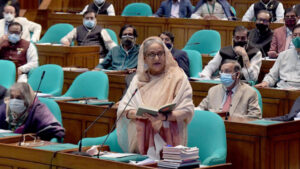 Prime minister Sheikh Hasina on Wednesday assured the parliament of uninterrupted power supply during taraweeh prayers and sehri times during Ramadan.
Prime minister Sheikh Hasina on Wednesday assured the parliament of uninterrupted power supply during taraweeh prayers and sehri times during Ramadan.
‘If necessary, load-shedding can be implemented for two or three hours at a time of the day when the demand will be low and it will be at a tolerable level. Then there will be no shortage of electricity. There will be no crisis, especially during taraweeh and sehri,’ she said.
The prime minister said that the government spent a lot of money to produce electricity and distribute it at a subsidised price.
‘Now the prices of everything, including oil, LNG, and transportation, have gone up globally. Still, we have efforts for an uninterrupted power supply,’ she said.
She also mentioned that the production of electricity could be hindered or reduced as the country had a shortage of fuel oil and LNG, and the production of power was a matter of mechanical issues.
‘Power generation can be reduced or interrupted for any reason,’ she said.
Sheikh Hasina said that although once upon a time there were 10 to 12 hours of load-shedding in the country, now the situation in the country has changed a lot.
‘But I think it is better to have load-shedding occasionally. Then people will not forget the past. At least they will realise where they were and are now,’ she said.
Hasina also expressed her hope that her government would be successful in reining in the prices of daily necessities during Ramadan and promised an uninterrupted power supply during taraweeh and sehri in the holy month.
‘I hope that price inflation will remain at a bearable level during the holy month of Ramadan and that it will be possible to rein in the prices of daily necessities in the market,’ she said.
The prime minister expressed her optimism in Jatiya Sangsad responding to a written question from ruling Awami League lawmaker from Bhola, Ali Azam, during the PM’s question and answer session.
She said that as a result of the government’s steps, people, especially poor families, elderly persons, widows, abandoned by husbands, and low-income groups, would feel relieved.
Sheikh Hasina said that the present government was the people’s government, and it was always trying to reduce the suffering of the people.
‘The government continues all activities to keep the prices of essential consumer goods normal. We have already managed to contain the abnormal rise in consumer items’ prices to a large extent,’ she said.
She mentioned that due to the increase in the prices of some products such as fuel oil, edible oil, wheat, fertilisers, various food products, consumer goods, and industrial raw materials in the world market, the pressure of inflation on imported items is being felt in Bangladesh.
The prime minister also said that various duty exemptions were being provided to reduce inflation.
In response to the question of another ruling party lawmaker from Bhola, Nurunnabi Chowdhury, the PM said that the country was continuously moving forward, and with the increase in economic activities, the quality of life of people had also improved.
‘As a result, the demand for natural gas, the main driving force of the economy, is also increasing gradually. So it is impossible to maintain supply to meet demand for gas,’ she said.
She also highlighted the steps taken by the government for the development of the energy sector.
The prime minister reiterated the government’s zero-tolerance policy against corruption while responding to the question of Independent lawmaker from Kishoreganj, Sohrab Uddin.
She said that it was not possible to ensure the overall development of the country due to corruption.
‘It is not possible to prevent corruption only through law enforcement and punishment. Corruption will be eradicated from society and the state through a coordinated initiative by building a social movement,’ she added.
Replying to the Awami League lawmaker from Lakshmipur, Noor Uddin Chowdhury Nayan, the prime minister said that initiatives will be taken to construct Shaheed Minar in all educational institutions that do not have Shaheed Minar.
In response to the question from an independent lawmaker from Nilphamari, Siddiqul Alam, the prime minister said that no project for the construction of multi-story residential flats had been taken up to rehabilitate the Urdu-speaking people living in camps and improve their quality of life.
‘Planned multi-storey residential flats can be constructed with government funding or grants if local needs and requirements arise after feasibility studies,’ she said.
New Age









